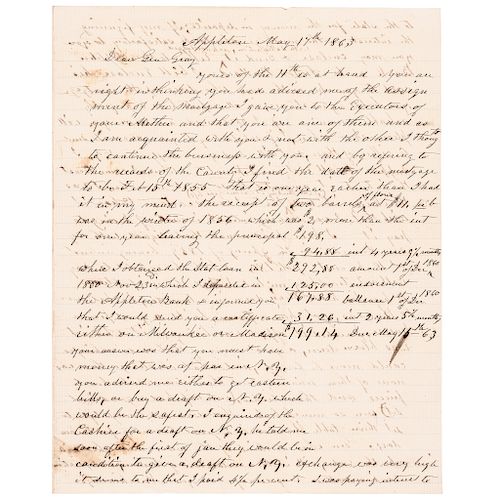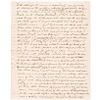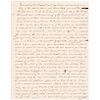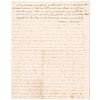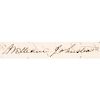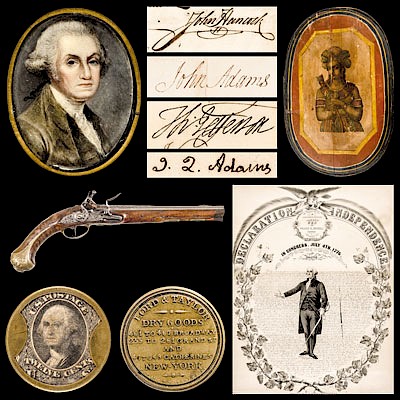1863 WILLIAM JOHNSTON Great Content ALS Civil War + Emancipation Proclamation !
Lot 44
Estimate:
$1,400 - $1,800
Absentee vs Live bid
Two ways to bid:
- Leave a max absentee bid and the platform will bid on your behalf up to your maximum bid during the live auction.
- Bid live during the auction and your bids will be submitted real-time to the auctioneer.
Bid Increments
| Price | Bid Increment |
|---|---|
| $0 | $10 |
| $200 | $20 |
| $300 | $25 |
| $500 | $50 |
| $1,000 | $100 |
| $2,000 | $200 |
| $3,000 | $250 |
| $5,000 | $500 |
| $10,000 | $1,000 |
| $20,000 | $2,000 |
| $30,000 | $2,500 |
| $50,000 | $5,000 |
| $100,000 | $10,000 |
| $200,000 | $20,000 |
| $300,000 | $25,000 |
| $500,000 | $50,000 |
About Auction
By Early American History Auctions
Jun 1, 2019
Set Reminder
2019-06-01 12:00:00
2019-06-01 12:00:00
America/New_York
Bidsquare
Bidsquare : Historic Autographs, Colonial Currency, Political Americana & Revolutionary War Era
https://www.bidsquare.com/auctions/early-american-history-auctions/historic-autographs-colonial-currency-political-americana-revolutionary-war-era-4152
Historic Autographs, Coins, Currency, Political, Americana, Historic Weaponry and Guns, John Adams, Thomas Jefferson, Early American History Auctions auctions@earlyamerican.com
Historic Autographs, Coins, Currency, Political, Americana, Historic Weaponry and Guns, John Adams, Thomas Jefferson, Early American History Auctions auctions@earlyamerican.com
- Lot Description
Autographs
William Johnston Former Governor of Pennsylvania, Discussing Civil War and the Emancipation Proclamation
WILLIAM F. JOHNSTON (1808-1872). 11th Governor of Pennsylvania, Autograph Letter Signed, Discussing Politics, the Civil War and Emancipation Proclamation!
May 17, 1863-Dated Civil War Period, Outstanding Historical Political & Emancipation Proclamation Content, Autograph Letter Signed, "William Johnston,"4 pages, Choice Very Fine. There is significant important content discussing the ongoing Civil War and the historic Emancipation Proclamation. This extensive, fully Handwritten Letter, from William Johnston, the former Governor of Pennsylvania, is addressed to General Gray. It is very well written in deep rich brown ink upon light blue lined period wove paper. Folded from mailing it measures approximately 7.75" x 9.75" (folded size), clearly and sharply signed "William Johnston" at its conclusion. The first part of this letter deals primarily with a mortgage and interest, then turns to important Politics. The latter portion adds more detail regarding the ongoing Political situation, the Civil War and further repercussions of the Emancipation Proclamation which was issued just a few months before writing this letter. This important Letter reads, in part:
"Appleton May 17th 1863 --- Dear General Gray --- (Bottom of page two)... Gen. what do think of the war, and what will be the end, will it be a restoration of Union, or separation and a Southern Confederacy. Are you a Breckinridge Democrat yet, I expect not, for I have not doubt of your being a true Union Man, and think likely you entertain similar views to D.S. Dickinson who was also a Breckinridge Democrat, and of the same wing of the Democratic party with yourself, or at least I so considered it. I like his course or what I have heard of him.
I believe the President to be honest and patriotic his course from the beginning of the rebellion, in the first place to restore the Union with all the rights to the south that they ever had under the Constitution. When that did not effect it in stopping the rebellion, he then issued his proclamation giving the rebellious states 100 days notice, that at the expiration of that time, those states who were in rebellion that their slaves should be free, and that no officer or soldier in the service of the U.S. should return or assist in returning slaves who had escaped from slavery to enjoy freedom.
I believe that the proclamation was right, and I also believe that had Fremont's Proclamation been sustained in giving freedom to the slaves of rebels, and confiscating the property of rebels, it would have prevented thousands from joining the rebels, if for no better principle than holding their slaves and the rest of their property they would have been Union men. I think the President has missed in retaining some officers in high commands so long, so as it seems to me that they cared more for safety of the rebels, than their own troops, but the President had to reconcile his political opponents or tried to do so but some of them would not be recounseled..."
William Freame Johnston (November 29, 1808 - October 25, 1872) was the 11th Governor of Pennsylvania from 1848 to 1852. A lawyer by training, Johnston became district attorney of Westmoreland County at the age of 21 in 1829. He was elected to the Pennsylvania state legislature and switched from the Democratic Party to the Whig Party in 1847 to run for the Pennsylvania Senate.
He was named Senate Speaker in 1848 and, upon the resignation of Governor Francis Shunk, assumed the position of governor. Although, because of the transition, Johnston could have delayed the scheduled October elections, he chose to let them proceed and was narrowly elected to the position, defeating Democratic candidate Morris Longstreth by only 297 votes. Although he was part of the Free Soil faction of Whigs opposed to slavery, Johnston faced the federal Fugitive Slave Act and fought its enforcement in Pennsylvania. Johnston lost re-election to Democrat William Bigler in 1851.
Johnston Commons on Penn State University is named for the former governor. His father built and operated the Kingston House in Unity Township, Pennsylvania. It was added to the National Register of Historic Places in 1983.
- Shipping Info
-
Early American provides in-house worldwide shipping. Please contact us directly if you have questions about your specific shipping requirements.
-
- Buyer's Premium



 EUR
EUR CAD
CAD AUD
AUD GBP
GBP MXN
MXN HKD
HKD CNY
CNY MYR
MYR SEK
SEK SGD
SGD CHF
CHF THB
THB